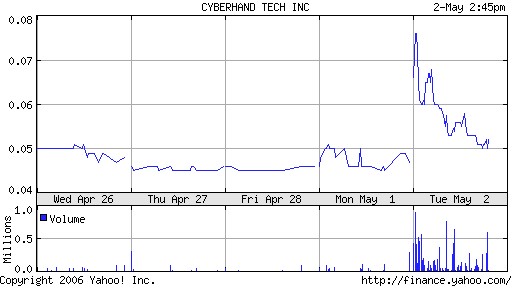Does that crap stock spam you get actually have an effect on stock prices? I’ve blogged on this subject earlier, about a site called Spam Stock Tracker, which shows that ownership of stocks marketed through spam are a money losing proposition.
Earlier this week, I posted an stock spam message from a company called Cyberhand (Pink Sheets: CYHD).
This stock spam pounded out on Tuesday, and a look at the chart shows that something has been going on, at least on an intraday basis:

So, it seems the spam is working to raise this stock price—on a very short term basis. And this is corroborated by Univeristy of Mannheim researcher Thorsten Holz, who said in a discussion group recently:
“together with a researcher from another German university, I took a closer look at stock spam recently. We could show that such spam messages indeed influence the traded volume and also the stock price.”
The research paper is here.
Harvard researcher Daniel Peng also looked at this issue and found:
“…stock spam is highly correlated with short-term spikes in trading volume and long-term falling stock price. I was unable to find any reliable evidence of short term price trends.”
Link here (thanks to Jose)
My guess is that penny stocks jump up immediately when sent and then decline down (as you can see from the above Cyberhand graph).
I’m not sure these studies took into consideration the actual buy and sell prices on the stock. The last price is different than what you can actually sell it for, because of the Bid (how much you pay to buy the stock) vs. the Ask (how much the dealer will pay you for it). The Bid and Ask is set by the market makers (the dealers who actually hold inventory in the stocks). Then, you have to take out the effect of commissions.
So can you make money rushing out and buying the stock when a stock spam hits? “Not that easy. Especially since an event study only gives abnormal returns. If the overall market goes down, you statistically loose less than the market, but that’s nevertheless a loss. And since pennystocks are not very liquid, there are further limitations…,” says one of the study’s co-authors, Thorsten Holz.
All in all, this whole Internet stock scam business is pretty disgusting.
Alex Eckelberry
